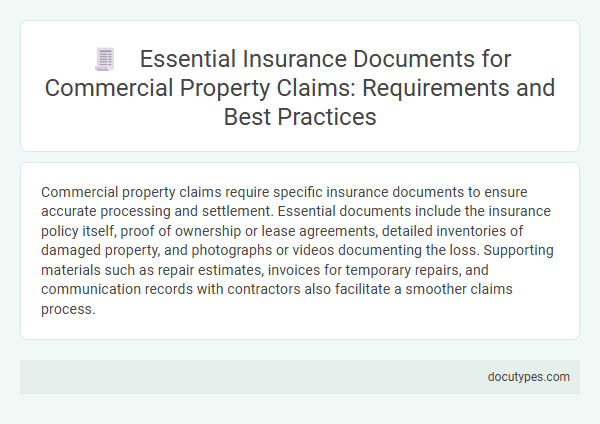Commercial property claims require specific insurance documents to ensure accurate processing and settlement. Essential documents include the insurance policy itself, proof of ownership or lease agreements, detailed inventories of damaged property, and photographs or videos documenting the loss. Supporting materials such as repair estimates, invoices for temporary repairs, and communication records with contractors also facilitate a smoother claims process.
Introduction to Commercial Property Insurance Claims
Commercial property insurance claims require specific documentation to ensure proper processing and settlement. Understanding the necessary documents helps streamline claims and protects business assets effectively.
- Proof of Ownership - Documents such as property deeds or lease agreements verify ownership or rental rights of the commercial property.
- Insurance Policy - The original insurance contract outlines coverage details and is essential for claim validation.
- Damage Inventory - A detailed list or photos of damaged property supports the extent of loss during the claim process.
Having these documents ready expedites claim approval and helps businesses recover from property damage more efficiently.
Understanding Essential Insurance Documents
Understanding essential insurance documents is crucial for filing a commercial property claim efficiently. These documents serve as proof of coverage and help establish the extent of your losses.
Key documents include the insurance policy, which outlines coverage details and exclusions, and the proof of loss form, required to formally report the claim. Supporting items such as property inventories and damage photographs assist in validating the claim's value and scope.
Policy Declarations Page: What to Include
| Types of Insurance Documents Needed for Commercial Property Claims | |
|---|---|
| Policy Declarations Page |
The Policy Declarations Page is a critical document in commercial property claims. It outlines the key details of the insurance agreement, including the policy number, insured property address, coverage limits, deductibles, and effective dates. This page serves as a summary of your insurance contract and establishes the foundation for claim processing. Ensure it includes:
|
| Additional Required Documents |
Beyond the Policy Declarations Page, commercial property claims usually require:
|
Proof of Loss: Documentation Requirements
Proof of loss is a critical document required to process commercial property insurance claims. It serves as official evidence that a loss has occurred and the extent of damages sustained.
Insurance companies typically require a detailed proof of loss statement outlining the date, cause, and value of the claimed damage. Supporting documents often include property inventories, repair estimates, and photographs of the damage. Accurate and timely submission of these materials ensures a smoother claims process and reduces the risk of claim denial.
Inventory and Valuation Records
Inventory and valuation records are essential documents for commercial property insurance claims, as they provide detailed lists of assets and their estimated worth. Accurate inventory records help verify the items damaged or lost during the claim process, supporting the assessment of the financial impact. Valuation records ensure that the claim reflects the true replacement cost or actual cash value of the property, facilitating a fair settlement with the insurer.
Photographic and Video Evidence
Photographic and video evidence are crucial for supporting commercial property insurance claims. These visual documents provide clear proof of damages and help expedite the claims process.
- Pre-Loss Condition Photos - Images or videos showing the property's state before the incident establish baseline condition for comparison.
- Post-Loss Damage Documentation - Detailed visuals capturing all damaged areas and items help insurers assess the extent and cause of loss.
- Contextual Evidence - Photos or footage showing the surrounding environment or cause of damage reinforce the claim's validity and support investigation findings.
Repair and Replacement Estimates
What types of insurance documents are needed for commercial property claims, specifically regarding repair and replacement estimates? Insurance companies require detailed repair and replacement estimates to assess the scope and cost of damages accurately. These documents should include itemized costs, contractor bids, and materials specifications to support the claim effectively.
Communication Logs and Correspondence
Effective handling of commercial property claims requires precise documentation. Communication logs and correspondence play a critical role in supporting your insurance claim.
- Communication Logs - Detailed records of all interactions with insurers, contractors, and adjusters provide a clear timeline of claim-related discussions.
- Email Correspondence - Email exchanges with relevant parties serve as written proof of claims status, approvals, and requests.
- Written Notices - Formal letters and notices sent to or received from the insurance company help confirm official communications and decisions.
Third-Party Reports and Expert Assessments
Commercial property claims require various insurance documents to ensure accurate processing and fair compensation. Third-party reports, such as police reports or fire department assessments, provide unbiased accounts of incidents, strengthening the claim's credibility. Expert assessments, including property damage evaluations and engineering inspections, offer professional insights crucial for determining repair costs and liability.
What Types of Insurance Documents Are Needed for Commercial Property Claims? Infographic

